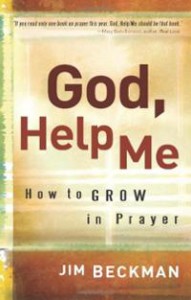I typed the confession to a friend, mildly hyperbolic and wholly rooted in frustration with my apparent commitment to distraction, while I half-watched the Olympics on a giant flat-screen.
I do not need to watch the men’s slalom more than I need to sit with Jesus, but I picked it (and even for a distraction, showed up with divided attention).
Then I thought of God, Help Me: How to Grow in Prayer — the book my friend and fellow blogger Edmund Mitchell recommended.
Then grad school got hard until graduation. Then I wrote a book. Then I wanted to hibernate.
But I stood. I stepped away from the slalom. I searched my room for the book. I found it, buried beneath others, and finished it over the weekend. The book, by Jim Beckman, who works as faculty at the Augustine Institute, is simultaneously a swift kick in the pants and an empathetic hug for whoever is “the worst at praying.”
Below you’ll find my favorite excerpts. Hope they kick you in the pants and hug you, too:
- “There is very little in prayer that depends on me. … The only things that I bring to the mix are consistently showing up for prayer and the disposition of my heart when I am there. With so little to contribute, I have decided that I want to make sure I’m doing my part every day.” -p. 13
- “The way we spend our time tends to reveal what we place value on. One author I read on this topic observed with amusement that no one ever died of hunger because of not having time to eat. There are things we do with our time every day, and if we track our activity, we’ll see what is truly important to us. If prayer is something we place value on, we’ll make time for it.” -p. 14
- “…desolation is one of the main stumbling blocks for many (young adults). The minute someone experiences some distance from God, it becomes a reason to stop praying and to give up spiritual disciplines. Yet the very purpose of the desolation is to strengthen your resolve, not for you to give up! So hold fast!” -p. 44
- “…This is classic desolation. It is evident even in some of the wording of her emotions: never, always, no one, the only person. This is the voice of the enemy: He tends to speak in absolutes like this.” -p. 52
- “If you desire to grow in your faith life, you must make a commitment to consistently spend time in prayer. There is no other way.” -p. 58
- “Little things done consistently become a formidable force in our lives. The issue is which direction these habits are moving us.” -p. 96
- “Our supernatural habits may deeply desire time with God in prayer, while our natural habits would desire more time in bed! ‘Grace has to operate through our faculties; we have to work for the destruction of habits that make our faculties bad instruments and for the development of habits that will make the good instruments — to the point where the supernature has become as sort of second nature.’ … Get out of bed to pray more time than you decide to sleep, and eventually a new habit will be formed. But get some resolve about you. This way of living isn’t easy, nor should it be.” -p. 112.
– – – –
Click here to learn more about God Help Me.
Disclosure: This post contains affiliate links. So, if you click the links and purchase the products I recommend, I earn a little commission at no extra cost to you. And when you do, I am sincerely grateful.


